Obesity and Avoiding the Doctor
People with obesity have to deal with negative stereotypes about their weight. This stigma comes from both the public and the healthcare community.1,2
These stereotypes include the ideas that people with obesity lack willpower or refuse to follow their doctor's recommendations. Many view people with obesity as fully responsible for their weight. But other factors play a part, including:1,2
- Biology
- Genetics
- Economics
These negative stereotypes affect the relationship between the person with obesity and their doctor. Some doctors report that they are not comfortable or lack the proper skills to work with people with obesity.1,3
A doctor might not work as hard to build a connection with a person with obesity. The doctor might be so focused on weight that they ignore other health issues. Or they might recommend weight loss rather than medicine or other therapies that could be beneficial.1,3
How a doctor's attitude affects people with obesity
A doctor's negative stereotypes about people with obesity can cause great harm. Doctors communicate with them less and spend less time with them during office visits.1,3
The person with obesity can end up feeling judged and disrespected. They might:1
- Delay going to the doctor for fear of being embarrassed
- Not go to follow-up visits to avoid an uncomfortable situation
- Not make recommended lifestyle changes to avoid bad health outcomes
People with a higher body mass index (BMI) feel discriminated against more often. BMI measures a person's weight in relation to their height. But BMI has been criticized as an incomplete tool for determining someone's overall health.3
Negative healthcare experiences are common for people with obesity
One study looked at 85 adults enrolled in a behavioral weight loss program. More than 70 percent reported having at least 1 healthcare experience that made them feel discriminated against.3
The 4 most common negative experiences were doctors who:3
- Said weight is a health problem when the person with obesity's health is good
- Blamed unrelated physical concerns on the person with obesity's weight
- Recommended a diet even when the person with obesity did not intend to discuss weight
- Told the person with obesity to lose weight without providing additional guidance
When you are disrespected by others, it can be difficult not to believe these harsh stereotypes about yourself. This is called internalized weight stigma. The more negative experiences someone with obesity faces, the more likely they will have internalized weight stigma. This stigma leads to more disordered eating such as uncontrolled eating and emotional eating.4
Red flags at the doctor's office
During a first visit with a doctor there may be some red flags to look out for. These can include:3
- Office equipment that is not made for people with obesity
- A doctor who avoids eye contact
- Being unable to opt out of being weighed
- A doctor who mentions your weight without asking if you are comfortable discussing it
A doctor who focuses on the number on a scale instead of each person's concerns might overlook certain medical conditions. For example, they may not screen a person who is not overweight for type 2 diabetes. Or they may view a person with obesity as unhealthy solely based on their weight.2
Weight-inclusive healthcare
A weight-inclusive view of health states that people can be healthy regardless of their size. Weight is not seen as a health behavior in and of itself. Health and nutrition programs are not designed to help the person reach a "normal" weight. Instead, their object will be for the person to:2,5
- Eat a wide variety of food
- Listen to their hunger cues
- Move their body in a way that feels safe and pleasurable
In weight-inclusive healthcare, the focus is on making changes that increase your well-being. Lowering blood sugar or cholesterol may be a goal, for example. But these markers are part of a holistic approach to healthcare that puts each unique person at the center.2,5

Join the conversation